Gaza ceasefire: Israel and Hamas agree on deal, hostages release
Qatar and the United States have announced a phased truce between Hamas and Israel, halting the 15-month devastating conflict in Gaza.
Israeli captives’ forum calls for protests in Tel Aviv over hostage return
The Hostages and Missing Families Forum, representing the relatives of Israeli captives held in Gaza, has called for a major demonstration in Tel Aviv on Saturday night.
The forum’s statement on social media urged participants to gather at the Hostages Square to demand the full return of all Israeli hostages.
The statement, posted on X, emphasised the importance of ensuring the safe return of every captive. "We are here until the last hostage returns!" the statement said. "An entire nation waits to see all hostages return home," it continued, stressing that the current ceasefire agreement should only end with the full release of all Israeli captives, within a clear and predetermined timeline.
In addition to the planned Tel Aviv rally, the forum announced that dozens of other protests will be held across the country in solidarity with the hostages and their families. The forum is urging the Israeli public to join the rallies and show their unwavering support for the captives, as they continue to call for their return.
2 French-Israelis named among first group of hostages to be freed by Hamas
French President Emmanuel Macron announced that two French-Israeli citizens, Ofer Kalderon and Ohad Yahalomi, are among the first group of hostages to be freed by Hamas as part of the ceasefire agreement between Israel and the militant group.
Macron confirmed the news in a social media post, stating that the two men are included in the list of 33 hostages to be released in the first phase of the agreement, following the announcement of a ceasefire deal in Gaza.
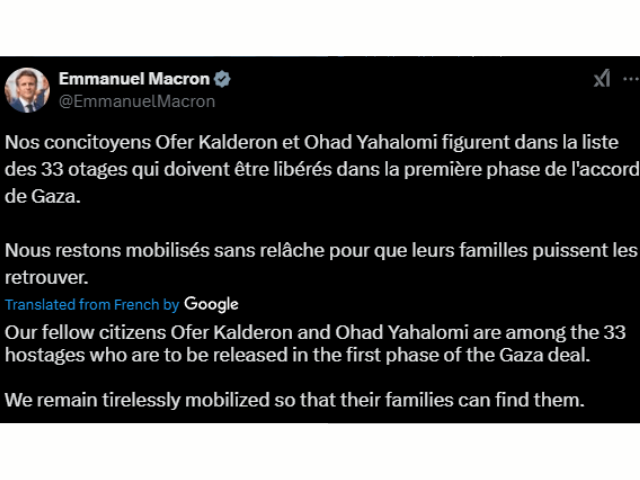
"Our fellow citizens Ofer Kalderon and Ohad Yahalomi are on the list of 33 hostages to be freed in the first phase of the Gaza accord," Macron wrote. He further assured that France remains fully committed to securing their return to their families.
Ceasefire deal: Israeli media publishes names of 33 captives for release
Israeli media outlets have published the names of 33 captives who are set to be released as part of the captives exchange phase of ceasefire agreement with Hamas. This release is a significant step in the ongoing negotiations between Israel and Hamas, following intense discussions regarding the ceasefire.
The individuals on the list are among the Israeli captives who had been held in Gaza, and their release is expected to occur in the initial phase of the ceasefire deal, which is set to take effect in the coming days. The names were disclosed by national Israeli media, which have reported that these individuals are among those selected for early release as part of a broader prisoner exchange.
The names in the list have been reported as: Liri Albag, Itzhak Elgarat, Karina Ariev, Ohad Ben Ami, Ariel Bibas, Yarden Bibas, Kfir Bibas, Shiri Bibas, Agam Berger, Gonen Romi, Daniella Gilboa, Emily Damari, Sagui Dekel Chen, Iair Horn, Omer Wenkert, Alexandre Sasha Troufanov, Arbel Yehoud, Ohad Yahalomi, Eliya Cohen, Or Levy, Naama Levy, Oded Lifshitz, Gadi Moshe Mozes, Avraham (Avera) Mengisto, Shlomo Mantzur , Keith Samuel Sigal, Tsachi Idan, Ofer Kalderon, Tal Shoham, Doron Steinbrecher, Omer Shem Tov, Hisham Al-Sayed and Eli Sharabi.
Israel’s defence minister cancels administrative detention orders for settlers
In a move linked to the upcoming ceasefire agreement, Israeli Defence Minister Israel Katz has announced the cancellation of all administrative detention orders against Israeli settlers in the occupied West Bank. Katz's decision is seen as a response to the planned release of some Palestinian prisoners as part of the broader ceasefire deal between Israel and Hamas.
In a statement, Katz explained that he had decided to release those detained under administrative orders, emphasising that the move was intended to "strengthen and encourage" Israeli settlements in the West Bank. These settlements, considered illegal under international law, are populated by Israeli citizens living on private Palestinian land in the occupied territories.
The announcement reflects the ongoing tensions within Israel regarding the ceasefire deal. Katz’s action is likely to reinforce support among settlers, many of whom view their presence in the West Bank as a cornerstone of Israel’s security. As of now, over 700,000 settlers reside in more than 150 settlements and 128 outposts scattered across the West Bank and East Jerusalem.
Far-right minister Ben-Gvir set to quit government over Gaza ceasefire deal
Israeli National Security Minister Itamar Ben-Gvir has once again vowed to resign from the government if the controversial ceasefire deal with Hamas is ratified. In a post on social media platform X, Ben-Gvir described the agreement as "disastrous" and argued that it would put Israeli lives at risk.
The far-right minister, a staunch critic of the ceasefire, explained that while he has great respect for Prime Minister Benjamin Netanyahu, he could not support a deal he believes would "release hundreds of terrorists with blood on their hands." He further warned that the agreement would allow thousands of armed fighters to return to northern Gaza and undermine Israel's defensive capabilities along the Philadelphi Route, a critical area for Israel’s security.

Ben-Gvir also reiterated his concerns about the hostages being released through negotiations with Hamas, stressing that while the hostages were "close to his heart," their release should not come at the cost of surrendering to the militant group.
As Netanyahu’s government faces mounting pressure from both internal and external factions, Ben-Gvir’s resignation threat casts a shadow over the potential passage of the ceasefire deal. His comments reflect the broader divisions within Israel’s ruling coalition over how to handle the ongoing conflict with Hamas.
Netanyahu meets with negotiating team as security cabinet set to convene
Israeli Prime Minister Benjamin Netanyahu is currently meeting with his negotiating team, which has just returned from a week of intense talks in Doha, Qatar, concerning the upcoming ceasefire agreement.
This crucial meeting comes just ahead of a security cabinet gathering that will determine Israel’s next steps regarding the highly contested deal with Hamas.
The security cabinet meeting is scheduled to take place shortly after Netanyahu’s discussions with the negotiators.
However, sources report that this meeting will not be the one in which the deal is officially ratified. Instead, a larger cabinet meeting is expected to take place on Saturday night, the day before the ceasefire deal is set to go into effect.
Despite the push towards a ceasefire, Netanyahu faces significant internal opposition, particularly from far-right members of his coalition. Some members have threatened to withdraw their support from the government if the deal is passed, creating a politically fraught environment for the Israeli leader.
Norwegian refugee council voices concerns over unclear aid access to Gaza
The Norwegian Refugee Council (NRC) has raised concerns over the uncertainty surrounding aid deliveries to Gaza, despite the announcement of a planned ceasefire agreement. According to Shaina Low, NRC’s communications adviser in Palestine, staff in Gaza have mixed feelings as they prepare for the impending truce.
“There is a mix of excitement and hope, but also fear because of the intensified bombardment we’ve seen over the last couple of days since the ceasefire was announced,” Low told Al Jazeera. “While we are hopeful that the ceasefire will come into effect over the weekend, we know the challenges will continue in terms of what people are facing and what we need to do to help them.”
Low also highlighted the unpredictability of the aid situation, saying the NRC had anticipated a ceasefire would occur eventually but faced many unknowns about what would be allowed to enter the besieged Palestinian enclave. “We’ve had to scenario plan,” she said, as the organisation has 48 trucks of supplies in Egypt, waiting to cross into Gaza, alongside further aid stockpiled in warehouses.
The lack of clarity on aid access remains a major issue for humanitarian agencies, who have faced long-standing difficulties in bringing necessary supplies into Gaza due to Israeli blockades and restrictions. The uncertainty continues to compound the dire humanitarian situation on the ground, as residents of Gaza endure the ongoing fallout from the months-long conflict.
More than 100 killed in Gaza since truce deal, civil defence reports
At least 101 Palestinians have been killed and more than 264 others injured in Israeli attacks on Gaza since the announcement of the recent ceasefire agreement, according to the Civil Defence in Gaza.
Despite the truce deal, violence has continued, with Gaza City being the hardest-hit area.
The Civil Defence reported that 82 of the fatalities occurred in Gaza City, with 27 of the victims being children and 31 women.
The ongoing Israeli airstrikes have raised concerns about the effectiveness of the ceasefire, which was meant to halt hostilities and facilitate the release of hostages and prisoners.
Israeli Finance Minister want to resume military operations after the first phase of the ceasefire

Israeli Prime Minister Benjamin Netanyahu is currently meeting with Israeli Finance Minister Bezalel Smotrich, according to reports from Israeli media outlets Ynet and Walla. The meeting comes amid growing opposition from Smotrich regarding the planned ceasefire deal in Gaza.
Smotrich, a prominent member of Netanyahu’s far-right coalition, has voiced concerns over the deal’s implications. He has sought assurances from Netanyahu that Israel will resume military operations after the first phase of the ceasefire, which includes the release of hostages and Palestinian prisoners. Smotrich's position reflects a hardline stance within Israel’s right-wing, which has argued that the ceasefire should not prevent Israel from occupying Gaza.
At least nine more Palestinians killed in Israeli airstrikes across Gaza
Despite a ceasefire deal expected to come into effect on Sunday, at least nine Palestinians have been killed in Israeli airstrikes across the Gaza Strip since the early hours of this morning, according to reports by Al Jazeera Arabic.
The strikes have targeted several areas in Gaza, causing widespread fear among residents who have been enduring months of intense fighting. Despite the looming ceasefire, which was negotiated to begin in a few days, Israeli forces have continued their military operations, contributing to an already devastating humanitarian situation.
Amid the continuing violence, human rights organisations, including Amnesty International, have called for urgent attention to the detention of Palestinian health workers. In a separate development, Amnesty International USA has demanded the release of Dr. Hussam Abu Safiya, the director of Gaza’s Kamal Adwan Hospital, who was detained by Israeli forces along with other health workers.
The organisation expressed concern over the safety of detained individuals, many of whom are at risk of torture and abuse.
Houthi leader claims Israel 'failed miserably' in Gaza
Leader of Yemen's Iran-backed Houthi rebels, Abdulmalik al-Huthi, has sharply criticised Israel's actions in Gaza, claiming that they "failed miserably" in its military objectives.
In a televised address, al-Huthi said, “The Israeli enemy failed to achieve its declared and clear goals.” He emphasised that Israel was unable to recover its prisoners without a prisoner exchange deal and condemned the country’s handling of the situation in Gaza.
The Houthi leader further stated that both Israel and the United States were “obliged” to accept the ceasefire, urging them to comply with the terms and bring the conflict to a close.
His remarks highlight the ongoing geopolitical tensions in the region, with Yemen’s Houthi rebels continuing to oppose Israeli actions in Gaza and aligning with Palestinian resistance.
Debate erupts over who brokered Gaza ceasefire: Biden or Trump?

The question of who should take credit for the Gaza ceasefire deal has sparked a heated debate after U.S. President Joe Biden announced the agreement, hailed as a major diplomatic achievement.
In a press conference, Biden proudly claimed that his team had negotiated the deal, which includes a ceasefire in exchange for the release of hostages held by Hamas, marking a potential turning point in the deadly conflict.
However, former President Donald Trump has also laid claim to the deal, arguing that it came to fruition due to his upcoming return to office.
Biden, when asked by a reporter who deserved credit for the deal, responded curtly: “Is that a joke?” before walking away from the podium. Despite his confident remarks, the reality is that Trump’s influence cannot be discounted, according to sources within both administrations. A senior Biden official confirmed that Trump’s team, including his envoy Steve Witkoff, played a critical role in the final stages of the negotiation. Netanyahu also appeared to give more public credit to Trump, thanking him first for his help in the negotiations.
Biden’s administration has been criticised for not putting more pressure on Israel earlier in the conflict, with some accusing it of enabling the prolonged violence.
Israeli Minister Ben-Gvir rejects ceasefire deal, threatens to resign

Israeli Security Minister Itamar Ben-Gvir has strongly opposed the ceasefire deal currently under consideration, calling it a "terrible" agreement that includes the release of "hundreds of murderers" and would require Israel to withdraw from the strategically vital Philadelphi Corridor.
Ben-Gvir, leader of the far-right Otzma Yehudit party, announced that if Israel’s parliament votes in favour of the deal, his party will resign from the coalition government. However, he clarified that while his party would leave the government, it would not attempt to bring down Prime Minister Benjamin Netanyahu's administration.
“This is a terrible deal,” Ben-Gvir stated. “If it goes through, we members of Otzma Yehudit will give letters of resignation to the prime minister and we will no longer be part of the government.”
“We will not participate in it if the deal is approved.”
He further urged Netanyahu to reconsider the agreement, calling for actions that would lead to the release of hostages and a decisive military victory over Hamas. “Do not take us backwards,” Ben-Gvir urged the prime minister. "We need to take steps to defeat Hamas and secure the return of all our hostages."
Although the ceasefire deal is still expected to pass through the Israeli security cabinet and the broader government, Ben-Gvir’s opposition is likely to weaken Netanyahu’s position.
Ben-Gvir, known for his controversial views, including advocating for harsher policies towards Palestinians, has previously claimed that he thwarted attempts to end the conflict prematurely. His calls for the IDF to continue fighting until Hamas is completely defeated have earned him support among the hardline right, but they have also exacerbated divisions within the government.
‘How does it feel to have your legacy be genocide?’ journalist Max Blumenthal confronts Blinken
US Secretary of State Antony Blinken’s farewell press conference was interrupted by a journalist Max Blumenthal who accused him of being responsible for genocide.
The protest occurred just as Blinken was beginning his address at the State Department briefing room.
“How does it feel to have your legacy be genocide?” The journalist continued filming himself and directing further accusations at Blinken.
“Three-hundred reporters in Gaza were on the receiving end of your bombs,” he yelled, referring to the ongoing conflict in Gaza and its toll on the media.
State Department officials quickly dragged the journalist out of the room, but the journalist continued to shout as he was removed, calling Blinken a “war criminal.”
This protest followed a similar disruption at a previous Blinken briefing, where an independent reporter had also been escorted out after accusing the Secretary of State of being complicit in war crimes. The reporter had shouted accusations during Blinken's address, claiming he was denied the chance to ask questions.
The protest highlights ongoing controversy surrounding US foreign policy, particularly regarding its role in the Israel-Gaza conflict. Despite the interruptions, Blinken continued with his remarks, aiming to address key issues in his final press conference as Secretary of State.
WFP: Ceasefire will allow 600 aid trucks a day into Gaza

The World Food Programme (WFP) has welcomed a ceasefire deal that would allow 600 aid trucks to enter Gaza each day, providing much-needed assistance to millions of people affected by the ongoing conflict.
According to WFP spokesperson Antoine Renard, the agreement will help bring vital food, fuel, and other supplies to Gaza, where 2.2 million people rely on humanitarian aid.
Before the war, Gaza received around 500 aid trucks daily, according to the UN, but that number plummeted to just nine trucks per day following the October 7 attack. As of early January, this figure had risen to an average of 51 trucks a day, still far from sufficient to meet the needs of the population.
Renard noted that WFP had been forced to provide only a third of the necessary food rations due to severe shortages. Key services, including bakeries, had to be suspended because of a lack of fuel, exacerbating the dire situation.
The ceasefire deal, which would allow 600 trucks, including 50 carrying fuel, to enter Gaza daily, is seen as a critical lifeline for the besieged region.
“It is essential that people in Gaza get back on their feet after 15 months of aid restrictions,” Renard stated.
However, the deal has faced opposition from some Israeli officials. Israeli Security Minister Itamar Ben-Gvir has argued that all aid to Gaza should be halted until hostages held by Hamas are returned.
Ben-Gvir even threatened to resign from the government if the ceasefire deal is ratified, underscoring the political tensions surrounding the agreement.
Gaza hostage deal confirmed by Israeli Prime Minister’s Office
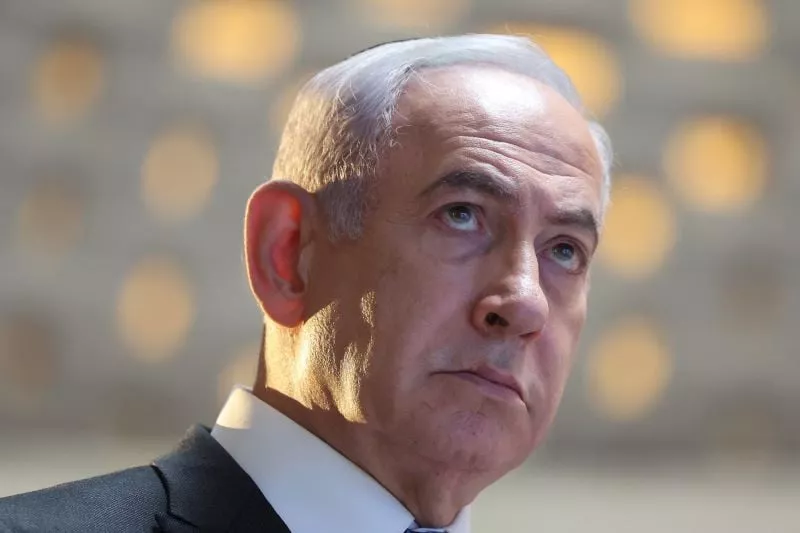
A ceasefire deal between Israel and Hamas to release hostages held in Gaza has been confirmed by the Israeli Prime Minister’s Office.
The agreement, brokered by Qatar, the United States, and Egypt, will see a pause in fighting and the phased release of hostages and Palestinian prisoners, the office confirmed.
Israeli Prime Minister Benjamin Netanyahu had previously refrained from commenting on the deal until all details were finalised. However, following the announcement, he confirmed that a resolution had been reached.
“The State of Israel is committed to achieving all the goals of the war, including the return of all our hostages – both living and dead,” the Prime Minister’s Office said in a statement.
Netanyahu has ordered Israel's security cabinet to convene on Friday to discuss the next steps. Afterward, the full Israeli government will meet to approve the deal.
The United States expressed confidence that the ceasefire would take effect by Sunday, although the Israeli cabinet has yet to vote on the agreement.
In Pictures: Thousands celebrate in Gaza as ceasefire deal is announced
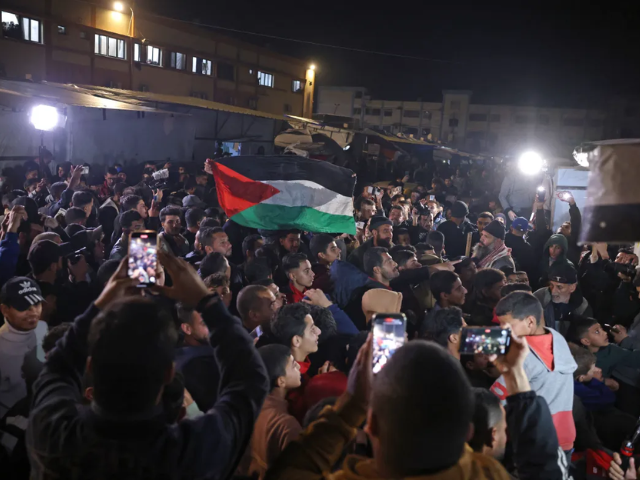
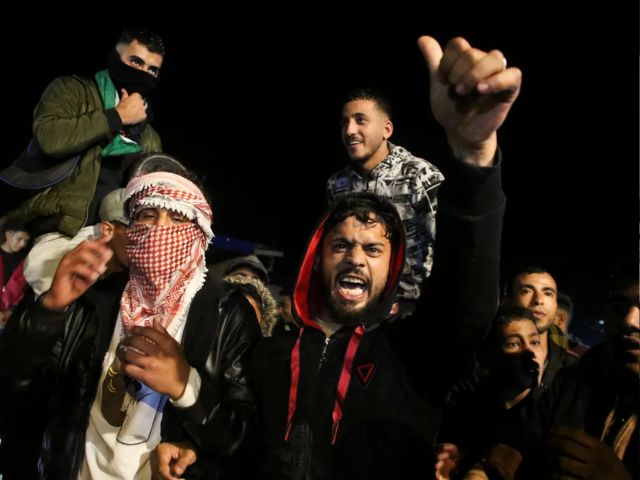
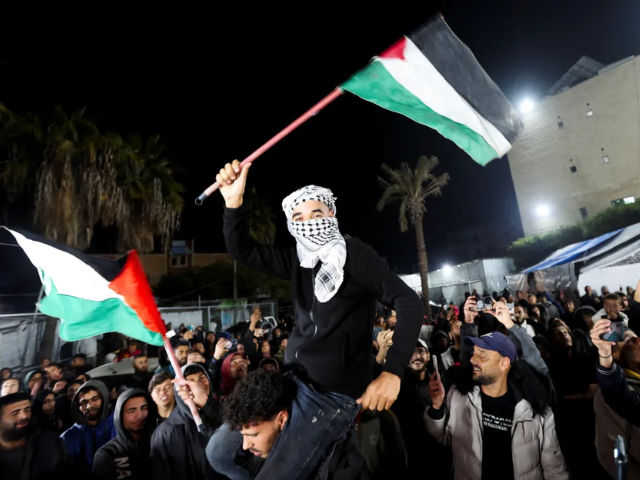
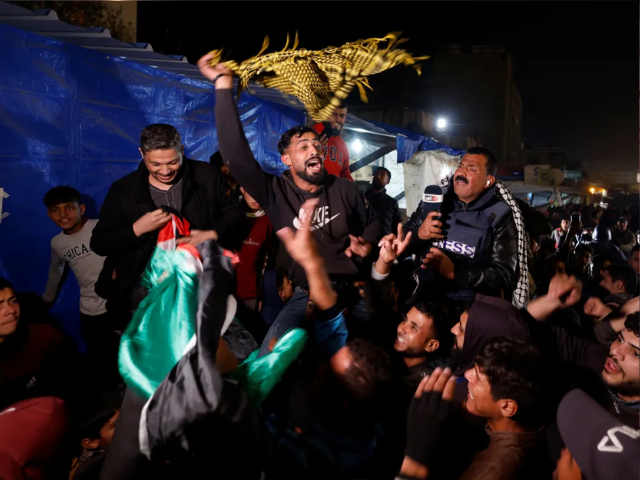
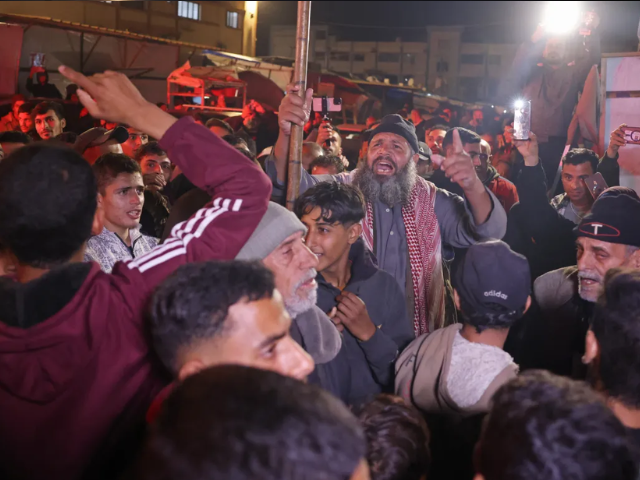
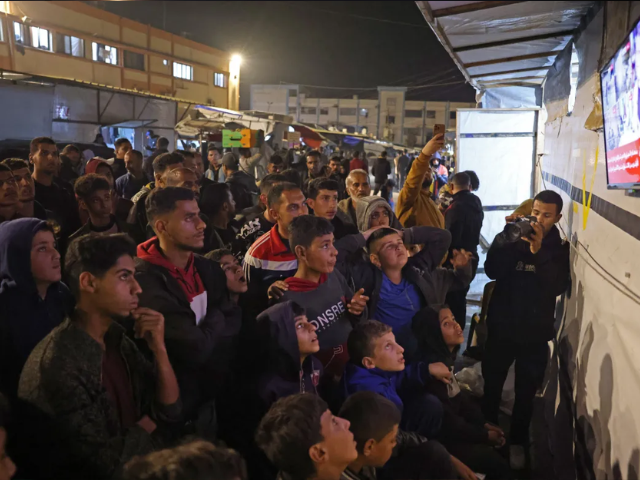
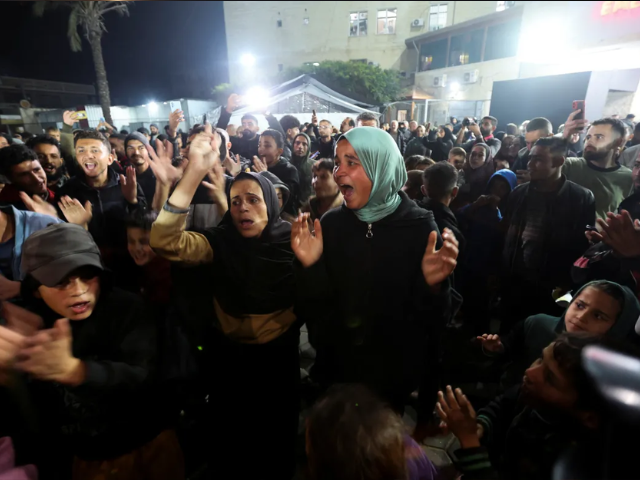
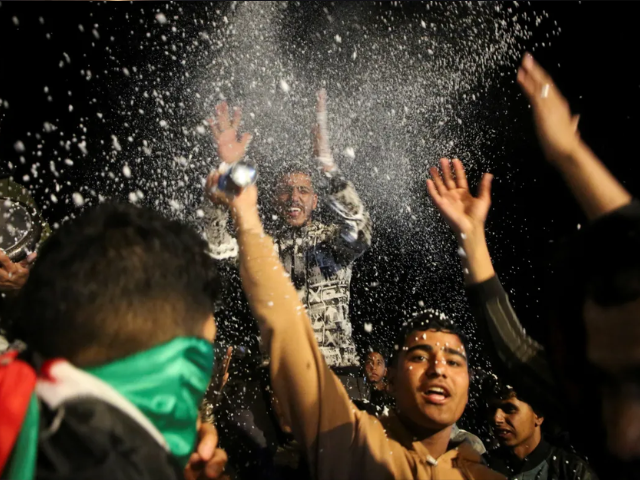
Israel kills at least 73 Palestinians after ceasefire announced
Since the announcement of a new ceasefire agreement, at least 73 Palestinians—20 children and 25 women among them—have been killed in Israeli attacks across Gaza, according to the enclave’s civil defense.
More than 230 others have been injured, marking a grim continuation of violence despite hopes for peace.
Israeli forces have also arrested 22 Palestinians across the West Bank in a series of overnight raids, according to the Palestinian Prisoner’s Society.
The detentions took place in the governorates of Hebron, Tulkarem, Ramallah, Bethlehem, and Tubas, with some of the detainees identified as former prisoners. This follows a pattern of near-daily Israeli operations in the region since October 2023. Israeli forces have carried out over 14,300 arrests in the occupied West Bank,
U.S. declares Hamas governing Gaza a "deal breaker" for Israel
The United States has firmly stated that any attempt by Hamas to resume governing Gaza would be a "deal breaker" for Israel, signaling a critical position in ongoing ceasefire negotiations between the militant group and Israel.
Following more than a year of intense mediation by Egyptian, Qatari, and American officials, the U.S. emphasized its commitment to ensuring that Hamas does not regain control over Gaza.
"The United States is committed to ensuring that Hamas never again resumes governing Gaza," State Department spokesman Matthew Miller told reporters.
"I can say with some certainty that a re-emergence of Hamas governing Gaza would be an absolute deal breaker for Israel," he added.
Israel puts Gaza ceasefire deal in jeopardy as Netanyahu delays cabinet meeting
Israeli Prime Minister Benjamin Netanyahu’s office has announced the delay of a crucial Cabinet meeting meant to approve a ceasefire deal between Israel and Hamas, accusing the Palestinian resistance group of undermining the agreement.
Netanyahu's office claims Hamas is attempting to "extort last-minute concessions," putting the fragile deal in jeopardy.
The ceasefire deal, which was supposed to be ratified, could significantly impact the ongoing war in Gaza, which has claimed the lives of tens of thousands of Palestinians since October 2023.
Netanyahu accuses Hamas of backtracking on prisoner release deal
Israeli Prime Minister Benjamin Netanyahu has accused Hamas of attempting to backtrack on a previously agreed-upon prisoner release deal, claiming that the group is now demanding to dictate the identities of Palestinians held in Israeli jails, contrary to earlier understandings.
Netanyahu's office issued a second statement, accusing Hamas of trying to “go back on the understandings” that were set out, particularly concerning the release of individuals deemed "mass murderers" by Israel.
Earlier Netanyahu had refrained from issuing a public statement on the matter, stating that final details were still being negotiated.
World leaders react to Israel-Hamas ceasefire agreement
World leaders have expressed varied responses following the ceasefire agreement reached between Israel and Hamas, aimed at ending the prolonged conflict in Gaza. The deal is seen as a potential breakthrough for humanitarian aid and regional stability, though opinions on its long-term impact differ.
U.S. President Joe Biden: At a White House briefing, President Joe Biden confirmed the ceasefire and hostage agreement between Israel and Hamas, stating, "Fighting in Gaza will stop, and soon the hostages will return home to their families." Biden also expressed hope that this deal could pave the way for a "credible pathway" to Palestinian statehood and normalization between Israel and its Arab neighbors, including Saudi Arabia.
U.S. President-Elect Donald Trump: President-Elect Donald Trump confirmed the hostages' release on his Truth Social platform, stressing the importance of preventing Gaza from becoming a "terrorist safe haven." Trump’s National Security team will continue monitoring the situation closely.
UN Secretary-General Antonio Guterres: UN Secretary-General Antonio Guterres welcomed the ceasefire, emphasizing the need for uninterrupted access to Gaza to deliver "lifesaving humanitarian support" to the Palestinian people.
Former U.S. President Barack Obama: Former President Barack Obama described the ceasefire as a positive step, particularly for halting bloodshed and facilitating aid to the region. Obama reiterated the importance of continued diplomatic efforts toward a long-term peace.
European Commission President Ursula von der Leyen: Ursula von der Leyen, President of the European Commission, expressed hope that the ceasefire would bring an end to the suffering in Gaza, while stressing the need for full implementation to achieve long-term stability.
South African Government: South Africa welcomed the ceasefire and condemned Israel’s actions in Gaza, calling for a just peace solution that respects the rights of both Palestinians and Israelis.
Australia’s Prime Minister Anthony Albanese Prime Minister Anthony Albanese called the ceasefire a "constructive step" toward peace but emphasized that Hamas should not have a role in Gaza's future governance.
Belgium’s Prime Minister Alexander De Croo: Belgian Prime Minister Alexander De Croo expressed relief for the hostages and their families, hoping that the ceasefire would lead to lasting peace and stability in the region.
German Foreign Secretary Annalena Baerbock: German Foreign Secretary Annalena Baerbock voiced hope that the ceasefire would provide a genuine opportunity to end the conflict, urging responsible actions from all involved.
British Prime Minister Keir Starmer: British Prime Minister Keir Starmer highlighted the urgency of delivering humanitarian aid to Gaza and called for a permanent resolution based on a two-state framework.
Norwegian Prime Minister Jonas Gahr Støre: Norwegian Prime Minister Jonas Gahr Støre emphasized the need for stronger Palestinian institutions and security guarantees for both sides in the region
Pakistan welcomes Gaza ceasefire, calls for permanent peace
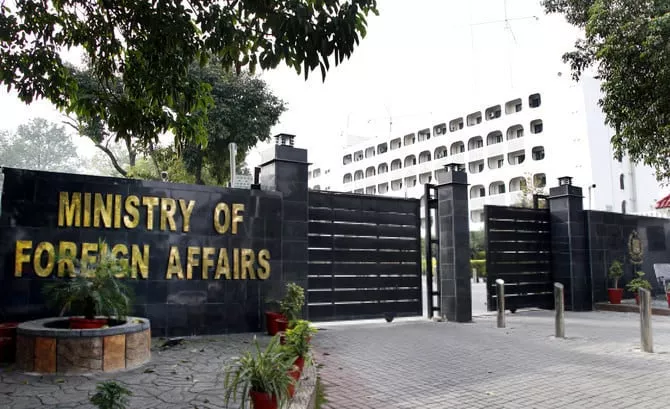
Pakistan’s Ministry of Foreign Affairs (MOFA) has welcomed the ceasefire agreement between Israel and Hamas, which was reached on January 15, 2025.
MOFA expressed hope that the truce would enable the delivery of humanitarian aid to Palestinians affected by the war. The statement condemned the "indiscriminate use of force" by Israeli forces, which has led to significant loss of life, displacement, and destruction in Gaza.
Pakistan also criticised Israel’s expansionist policies, describing them as a destabilising factor in the region. Islamabad reiterated its support for a "just, comprehensive, and durable" solution to the Palestinian issue, advocating for an independent Palestinian state based on pre-1967 borders, with Al-Quds Al-Sharif as its capital.
Iran’s Revolutionary Guards call Gaza ceasefire a "victory" for Palestinians
Iran's Revolutionary Guards hailed the ceasefire between Israel and Hamas as a “clear victory” for Palestinians and a significant “defeat” for Israel.
In a statement, the Islamic Revolutionary Guard Corps (IRGC) celebrated the cessation of hostilities in Gaza, calling it a "great victory for Palestine" and a "bigger defeat for the monstrous Zionist regime." The statement reflects Iran’s longstanding support for Palestinian groups and its opposition to Israel’s military actions in Gaza.
The IRGC's statement reinforces Iran's support for Hamas and other Palestinian factions, marking the ceasefire as a strategic victory in the ongoing struggle between Israel and Palestinian groups.
Aid groups call for urgent scaling up of humanitarian access to Gaza
International aid agencies are calling for an urgent scaling up of humanitarian access to Gaza, where a catastrophic crisis has unfolded after 15 months of war.
UNRWA, the main humanitarian agency in Gaza, called for “rapid, unhindered and uninterrupted humanitarian access” to address the immense suffering. Over 2 million people rely on the agency, with one million seeking shelter amid ongoing fighting.
UNICEF described the deal as "long overdue," highlighting the tragic impact on children, with at least 14,500 killed and 17,000 unaccompanied minors. The agency urged both sides to allow aid to reach Gaza, focusing on malnutrition treatment and vaccination efforts for vulnerable children.
The World Food Programme stated it has enough supplies to feed over a million people for three months but requires urgent funding and open border crossings to scale up aid. Similarly, the Red Cross expressed readiness to expand its operations, although it stressed the complexity of facilitating the release of hostages and providing aid.
The Norwegian Refugee Council (NRC) called for the immediate lifting of restrictions on aid to prevent famine-like conditions and stressed the need to rebuild Gaza’s destroyed infrastructure. The International Rescue Committee echoed these calls, highlighting the urgent need for food, medicine, water, and safe access for aid workers.
As the ceasefire holds, aid organizations are rallying to scale up operations and meet the overwhelming needs in Gaza.
Middle Eastern react to Israel-Hamas ceasefire deal
Middle East have expressed support for the Israel-Hamas ceasefire deal, calling for humanitarian aid to be delivered to Gaza and for a lasting peace agreement.
Egypt’s President Abdel Fattah el-Sisi commended the efforts of Egypt, Qatar, and the US in facilitating the ceasefire, urging the entry of urgent humanitarian aid into Gaza.
Turkish President Recep Tayyip Erdogan expressed hope that the deal would benefit the region and promote lasting peace, particularly for Palestinians.
Jordan’s Foreign Minister Ayman Safadi called on world powers to ensure the “sufficient and durable” delivery of aid, while Iraq’s Foreign Ministry stressed the need to rebuild Gaza.
Saudi Arabia’s Foreign Ministry underscored the need for Israel to fully withdraw from Gaza and for displaced Palestinians to return home.
UAE Foreign Minister Abdullah Bin Zayed also called for aid access and for both sides to stick to their commitments, including the release of prisoners.
The Gulf Cooperation Council (GCC) expressed hope that the ceasefire would restore security and facilitate the return of displaced Palestinians.
Israeli PM Netanyahu says ceasefire deal with Hamas still not finalised
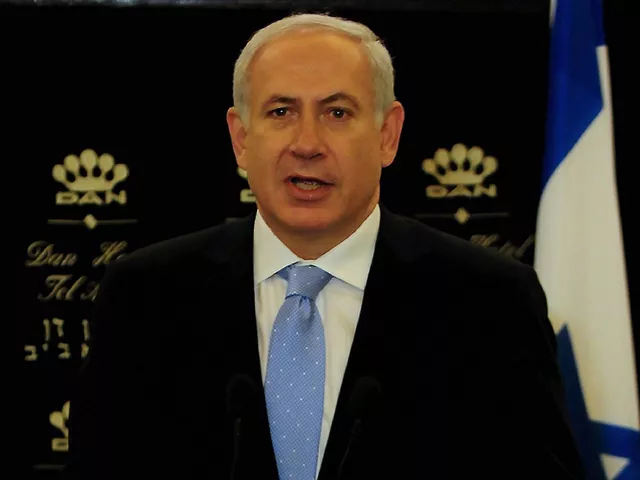
Israeli Prime Minister Benjamin Netanyahu’s office confirmed that a ceasefire deal with Hamas has not yet been finalised, despite multiple reports suggesting an agreement had been reached.
In a statement, Netanyahu’s office acknowledged that final details of the deal were still unresolved, adding that it hoped “details will be finalized tonight.”
“An official statement by Prime Minister Benjamin Netanyahu will be issued only after the completion of the final details of the agreement, which are being worked on at present.”
Israel-Hamas ceasefire: What you need to know about the phases and guarantees
The agreement, which aims to end the devastating 15-month conflict, is backed by Qatar, Egypt, and the United States to ensure its implementation.
First Phase: Hostages, Prisoner Exchange, and Humanitarian Aid
The first phase of the ceasefire, lasting six weeks, involves several significant exchanges. Hamas will release 33 Israeli captives, including children, female soldiers, civilians, and men over 50. In return, Israel will free 50 Palestinian prisoners for each female soldier and 30 for each civilian captive.
In addition to the prisoner exchanges, Israel will release all women and children under 19 it has detained from Gaza since the October 7, 2023 attack. Israel has also agreed to gradually allow unarmed Palestinians to return to the northern part of the Gaza Strip, while facilitating a surge of humanitarian aid, with up to 600 trucks per day.
Second Phase: Full Captive Release and Israeli Withdrawal
If the conditions of phase one are met, the second phase will see the release of all remaining living captives, mostly male soldiers, by Hamas. In exchange, Israel will free more Palestinians from its prisons.
The second phase also involves Israel’s full withdrawal from Gaza, including from the militarized Philadelphi corridor, the border area between Gaza and Egypt. The complete withdrawal aims to de-escalate the conflict and prepare for long-term stability in the region.
Third Phase: Reconstruction and a Plan for Peace
Should the second phase be successfully implemented, the third phase will focus on the return of the bodies of remaining captives. In return, Israel and Hamas will agree to a multi-year reconstruction plan for Gaza, which will be conducted under international supervision.
Israel and Hamas agree to phased ceasefire after 15 months of conflict

In a significant development, US and Qatari officials announced that negotiators have successfully reached a phased agreement to end the Israel's brutal campaign in Gaza.
The deal, aimed at halting the bloodshed that has left tens of thousands dead, marks a pivotal moment after 15 months of Israel's atrocities.
The ceasefire, set to take effect on Sunday, includes a six-week halt in hostilities, providing a window for the gradual withdrawal of Israeli forces from Gaza. The agreement also outlines a critical provision for the exchange of hostages held by Hamas and Palestinian prisoners detained by Israel.
The conflict began on October 7, 2023. Israel initiated an air and ground assault on Gaza, which has resulted in more than 46,000 deaths, according to Gaza health ministry figures. Hundreds of thousands of displaced people continue to live in harsh conditions in makeshift shelters.
As the ceasefire takes effect, the hope is that this agreement will provide much-needed relief for both sides and pave the way for a lasting peace in the region.
